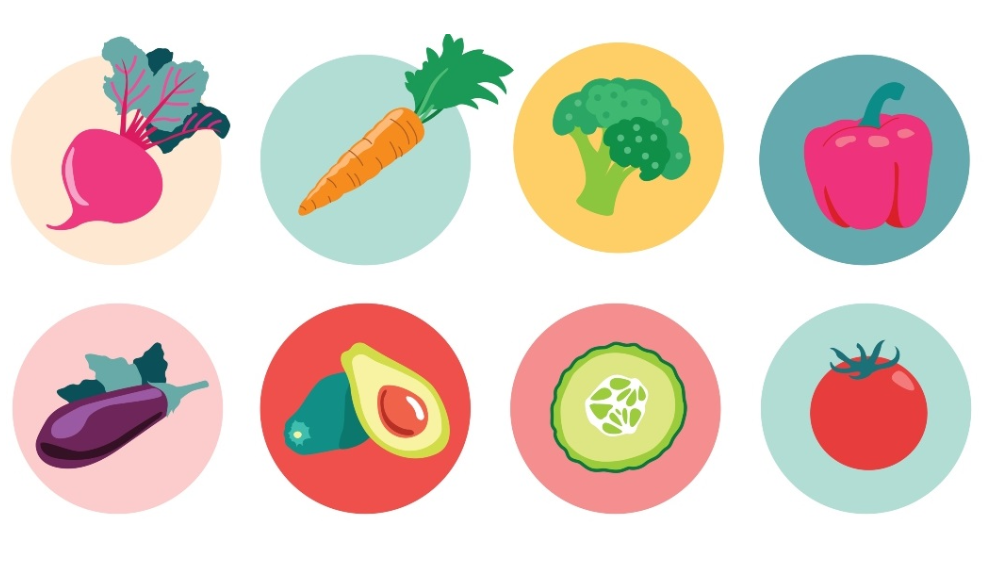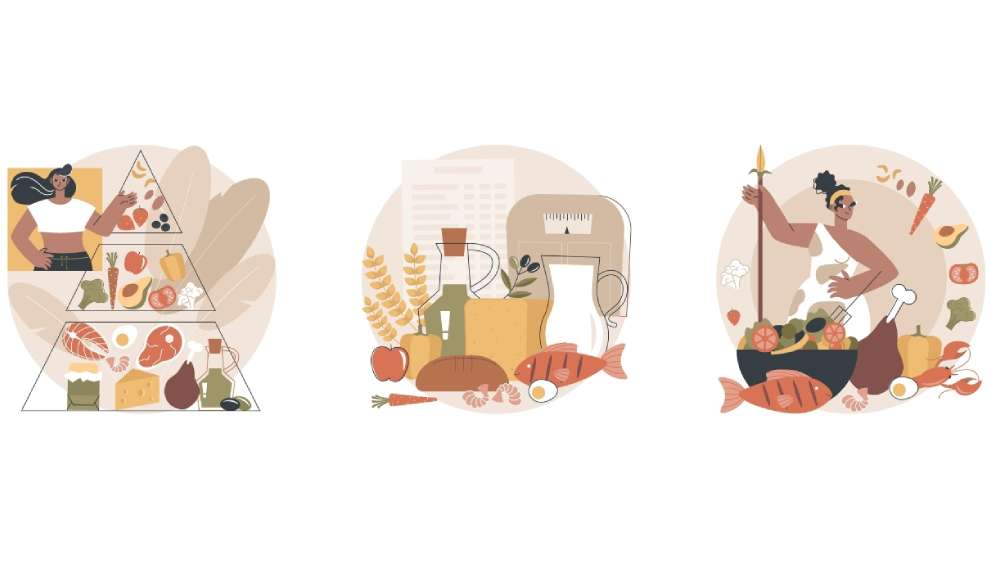Everything you need to know about healthy eating
- Overview
You can find everything you need to know about the basics of diet and nutrition below, along with some helpful tips on how best to balance your diet and what eating a wide variety of foods can do to help your mind and body.
Key points
- Ensuring you eat all available food groups will give your body the good quality fuel it needs
- Avoid ultra-processed foods wherever possible as they contribute to chronic health conditions as we age
- Fats, protein and carbohydrates are all essential when intake is proportionate and balanced
- The colour of a food is a great indicator of the amount of nutrients and vitamins inside
- A poor diet impacts us mentally as well as physically, affecting our concentration and awareness
- Cooking from scratch and batch cooking are great ways to stay healthy and save money.
Why is healthy eating so important?

A healthy diet means we are eating the foods that our brain and body need to get everything done.
This includes processes that occur in the background unconsciously and things we have to think about like exercising and concentrating at work.
A balanced diet helps with ageing, fighting off illness and repairing and replenishing our cellular structure in the background.
If we eat unhealthy food regularly, we’re at risk of developing a chronic health condition that impacts expectancy and quality of life as we get older.
- Fighting illness and combatting disease: eating the right good quality food plays a big role in keeping us fit and healthy in the face of illness and disease. Avoiding ultra-processed food minimises our risk of developing chronic health conditions like diabetes and heart disease
- Healthy ageing: eating a healthy diet contributes to how we look and feel as we age. Getting a balance of high-quality nutrients, minerals and vitamins helps our body and mind continue to work at a high level over time
- Speeding up bodily functions: everything our body and mind does requires fuel. To avoid feeling mentally and physically sluggish, give your body a variety of macronutrients and vitamins.
What does a healthy diet look like?
Because we’re all different, what works for one person might not work as well for the next person. There are, however, a few basic universal principles. For example, if we aren’t getting enough of a core macronutrient, our body and mind will soon let us know about it.
Good principles that you can apply to your own diet include eating at least 5 servings of fruit and vegetables a day, and moderate amounts of meat, fish, eggs, and dairy. Raw foods like beans, lentils, wholegrains, raw nuts and seeds are great because our body doesn’t have to work hard to digest them. Processed and saturated foods should be avoided and we should make sure the overwhelming majority of the sugar we consume comes from fresh fruit.
Learn more about the role of healthy eating
The Let’s Talk Health podcast brings you relaxed conversations with industry-leading experts who can help you make positive and sustainable change.
As the UK’s largest healthcare charity, we are able to showcase experts from a range of health and wellbeing areas, including:
- Mental health
- Nutrition
- Children’s health
- Clinical practice
- Fitness and personal training
To kickstart the conversation around nutrition, we sat down with Nutritional Therapist Steph Weekes to discuss nutrition, diet, and how changes to what we eat can have a big effect on our physical and mental health.
She also spoke at length with us about hydration, how snacking impacts the body, and why fear and inaccurate information can put people off making healthier food choices.
Interested? Click either of the links below to start listening
Disease prevention

Disease results from an ongoing loss of physiological, cognitive, emotional and or physical function.
Eating a nutrient dense diet, together with an active lifestyle, stress management and sufficient sleep will protect us from developing chronic degenerative health conditions such as obesity, osteoporosis, heart disease, diabetes, dementia arthritis and many cancers.
The danger of processed food
Ultra-processed typically contain high levels of salt, sugar, colourings, flavourings and processed vegetable oils, all of which are proven to contribute to the onset of heart disease. Ultra-processed foods are often calorie dense and contain little or no nutritional value. They should be consumed occasionally as a treat and shouldn’t form the basis of any diet as they can damage long-term health.
These include:
- Sweets
- Tinned meat
- Processed and refined carbohydrates
- Crisps
- Mass-produced biscuits
- Cakes
- White bread
- Some breakfast cereals
- Soft and fizzy drinks
- Fruit juices
The Mediterranean diet
The Mediterranean diet is a well-researched diet with numerous studies demonstrating its benefits for promoting health and longevity. Whilst it’s not applicable for everyone (you may be vegan or vegetarian), the basic principles can be transferred and applied to your diet.
Eaten throughout the region in Spain and Italy, the Mediterranean diet is almost completely free of ultra-processed food, prioritising instead foods that are locally sourced and high in micronutrients, antioxidants, and anti-inflammatory ingredients. The diet includes a lot of spices, herbs and extra virgin olive oil.
The diet is refined and stripped back, seeing foods that are high in trans-fats replaced by vegetables, fruit, beans, lentils, and nuts. Following a Mediterranean diet means eating lots of raw food which helps us avoid the use of heat and chemicals which are associated with chronic and degenerative health conditions.
Top tips for a healthy diet
- Stay hydrated by drinking plenty of water. Avoid sugary squashes, fruit juices, alcohol and heavily caffeinated energy drinks
- If you’re unsure where to start, you can’t go wrong with eating lots of colourful fruits and vegetables
- Avoid ultra-processed trans-fats. These are commonly found in frozen foods, takeaways, cakes, sweets and crisps
- Start a food diary to find out what your body wants, likes and needs more of
- Prioritise a diet that gets enough of the three main macronutrients (protein, carbohydrates and fats)
- Incorporate exercise into your diet to promote better absorption of minerals and nutrients
What are the three main macronutrients?
You’ve probably heard about macronutrients if you’re looking to improve your diet. Macronutrients are the essential nutrients required by the human body in relatively large quantities to support growth, development, and overall health. There are three types of macronutrients. These are protein, carbohydrates, and fats.
The repercussions of not getting enough of any of these can be serious, ranging from sluggishness and difficulty staying alert to serious diseases and chronic illness. The overall health of both the mind and body relies on us taking in enough good quality macronutrients as fuel.
Take a look below to find out more about the role protein, carbohydrates and fats play in maintaining a healthy diet.
The role and importance of protein
Protein is essential. Proteins are the building blocks for our cells and body tissue. They provide the base so all our bodily processes and functions can take place.
One of its primary roles is aiding with muscle growth, repair, and recovery. If you’re exercising frequently, you will likely require more protein because your muscles are being torn whilst working out. Healthy sources of protein include tofu, chicken, eggs, yoghurt, and beans.
Protein is also responsible for balancing blood sugar, maintaining immune system function, healing wounds, regulating healthy brain function and producing mood-balancing neurotransmitters.

Good sources of protein
Proteins derived from animals contain all 9 essential amino acids. Good sources include meat, fish, poultry, eggs and dairy, free range wherever possible.
If you’re vegan or vegetarian, good sources of complete protein include soybeans, grains, amaranth, buckwheat, and quinoa.
Pulses, legumes, raw nuts and seeds are important sources of protein for those following a completely plant-based diet but they need to be combined with other protein rich plant foods to gain the full amino acid spectrum daily.
What about protein shakes?
You may also want to supplement your diet with protein shakes or powers if you're exercising heavily or training a lot. If your protein requirements are high due to exercise levels, you may need more protein than most (up to 1.7g or protein per kg of weight).
You should aim to get as much of your nutrition from whole foods to maintain good health. However, if keeping up with your protein requirements becomes challenging, protein shakes can be a good way of supplementing your intake.
The role and importance of fats
Fats can be divided into saturated and unsaturated fats depending on their chemical structure. Saturated fats are the unhealthier of the two fat types. Too much saturated fat raises your cholesterol and puts you at an increased risk of developing heart disease.
Healthy fats (unsaturated) play an important role in maintaining healthy and proper cell structures and in the production of steroid hormones. They’re just as important for helping the body absorb fat soluble vitamins (A, D, E, K) and for maintaining good heart health, hormonal balance, mental health and good immune system function.
Polyunsaturated fats (PUFAs) are an essential part of our diet as they can’t be synthesized by the body. They include omega 3 and omega 6 fatty acids.
Unsaturated fats can be divided into mono-and polyunsaturated fats. Monounsaturated fats (MUFAs) include olive oil, olives, nuts, seeds and their oils and avocados. They are mostly liquid at room temperature and are well known for their heart protective properties and high antioxidant content.
What about saturated fats?
Saturated fats are mostly solid at room temperature and are found in meat, dairy products, ghee, coconut oil, and butter. These are considered the least healthy fat as they do not have as many heart protective and antioxidant qualities as unsaturated fats.
Generally, we should consume less saturated fats and more unsaturated fats for optimum heart health and the prevention of chronic disease. We should try to minimise consumption of processed vegetable oils present in many mass-produced foods as best we can. Foods that are highly processed like takeaway foods are linked to chronic long-term health issues like heart disease.
The role of Omega fats
Omega 3 fats are present in oily fish including salmon, mackerel, sardines, flax and chia seeds, and walnuts. Omega 3 fats are well researched for their anti-inflammatory properties and should be included as part of any healthy, balanced diet.
Omega 6 fats are present in vegetable oils such as sunflower oil, some nuts and seeds and many processed foods. The ratio at which you consume omega 3 and omega 6 fatty acids is also important to consider. The Western diet is often sufficient or even considered high in omega 6 fats but relatively low in omega 3 rich foods.
The role and importance of carbohydrates
Carbohydrates provide energy and fuel for our muscles and are our primary source of fuel for the brain. There are two main types of carbohydrates; refined and unrefined.
Refined carbohydrates include white flour products like white bread and white pasta, breakfast cereals, biscuits, cakes, alcohol, fizzy drinks and fruit juices. These aren't foods that are high in fibre, nor are they particularly nutritious. These carbohydrates break down into energy quickly and provide us with a quick burst of energy.
Refined carbohydrates often fall into the ultra-processed category and so can contribute to long-term chronic health conditions when consumed in excess.
Unrefined (or complex) carbohydrates include wholegrains such as brown rice, oats, brown pasta, brown bread, millet, bulgur, couscous, barley as well as amaranth, buckwheat and quinoa.
All root vegetables including potatoes, sweet potatoes, beetroot, parsnips, carrots, celeriac, swede, beans and pulses are complex carbohydrates. These carbohydrates are nutritious but should be consumed in line with our activity levels.
What about vitamins and minerals?
Vitamins and minerals are essential nutrients, required in smaller quantities compared to macronutrients. Our body can produce some vitamins, but mostly, we need to get them in our diet. Vitamins and minerals play an important role in DNA synthesis, energy production, immune system function, bone and skin health and much, much more.
Some vitamins and antioxidants are fat soluble including vitamins A, D, E and K as well as many plant chemicals and antioxidants including Lycopene and Beta-carotene. Other vitamins are water soluble including B complex vitamins and vitamin C. We need to consume more water-soluble vitamins as our body doesn’t store them.
Vitamin and mineral rich foods include:
- Vegetables
- Beans
- Lentils
- Fruits
- Unsaturated fats
- Fresh herbs
- Nuts
- Seeds
Money saving tips
- Get organised: create a weekly menu plan and shopping list to avoid doing your food shopping when hungry. Only buy what you need.
- Shop online: shopping online reduces the temptation to spend on in-store offers.
- Cook from scratch: the occasional takeaway is fine but home-cooked meals are the healthiest and most cost-effective way of eating
- Batch cook: freeze in portion size and keep your freezer organised so you always know what you’ve got in
- Stock up: keep large amounts of nutrient dense staple dry ingredients like wholegrains, beans, and lentils for instant healthy meal inspiration
- Eat plant-based: plant proteins such as tofu, beans and lentils are often cheaper than animal sources, especially when it comes to the quality of the produce.
- Freeze your vegetables: you can fill out any meal by adding frozen vegetables for more nutrition and colour
Last updated Tuesday 15 October 2024
First published on Monday 31 July 2023

